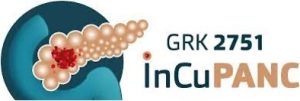CAR T-cell therapy
CAR T-cells are engineered immune cells carrying chimeric T-cell receptors directed against tumor antigens, which are highly efficient in the treatment of haematologic malignancies. Nevertheless, one-time CAR T-cell infusions cause severe side effects in nearly 50% of the patients, and are not sufficient for the treatment of solid tumors. Therefore we aim to develop a hydrogel-based polymere matrix which allows nourishment, proliferation and survival of CAR-Ts over several weeks, which can be subcutaneously injected and therefore enables slow release of CAR-Ts into the body to prevent side effects and long-term treatment of solid tumors.


Prof. Dr. Christine Dierks

Prof. Dr. Sonja M. Keßler
Publications
Chernyakov D, Skorobohatko O, et int., Dierks C. ROR1-CAR T-cells as novel treatment strategy for anaplastic thyroid carcinoma. J. Immunother. Cancer 10 (2022) https://doi.org/10.1136/jitc-2022-ITOC9.41
Dierks C., Seufert, J. et int., Thomusch O. Combination of Lenvatinib and Pembrolizumab is an effective treatment option for anaplastic and poorly differentiated thyroid carcinoma. Thyroid 31(7), 1076-1085 (2021) https://doi.org/10.1089/thy.2020.0322
Jäger A, Gambheer S, et int, Dierks C. Activated granulocytes and inflammatory cytokine signaling drive T-cell lymphoma progression and disease symptoms, Blood (2023) https://doi.org/10.1182/blood.2022015653
Kendzia S, Franke S, Kröhler, T. et al. A combined computational and functional approach identifies IGF2BP2 as a driver of chemoresistance in a wide array of pre-clinical models of colorectal cancer. Mol Cancer 22, 89 (2023). https://doi.org/10.1186/s12943-023-01787-x
Collaborative research centers / Network




Patents / Awards
2018: Gilead Forschungspreis Receptor signaling
2022: ESMO Highlight: ATLEP Trial
